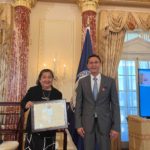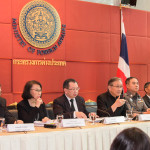
Moving ahead to free seafood supply chain of human trafficking and forced labor
The Royal Thai Embassy would like to state that Thailand is strongly against human trafficking and forced labor wherever it takes place and does not condone any wrongdoings. The case involving “Gig Peeling Shed” mentioned in the AP report “Global supermarkets selling shrimps peeled by slaves” is no exception. Latest updates are as follows:
Strict law enforcement
The “Gig Peeling Shed” was immediately shut down by the authorities following an inspection on November 9, 2015. The owner of the shed and 3 other individuals have been charged with several offenses, including those under anti-human trafficking, labor protection and factory laws. Further actions will be taken against anyone who are found to break the laws without exception.
Taking human rights approach to protect victims
21 workers and 10 children below the age of 18 were rescued during the inspection of the “Gig Peeling Shed” and identified as human trafficking victims. They are entitled to protection as victims under the anti-human trafficking law and were not prosecuted under the Thai immigration law. They are now being cared for at the shelters run by the Ministry of Social Development and Human Security, where a range of services are provided for victims.
The Thai Government is taking systematic approach to reduce vulnerability in the long run. For example, a new round of registration of illegal migrant workers from neighboring countries in fishing vessels and seafood processing factories has started from November 2, 2015 to January 30, 2016 in order to facilitate their regularization. During the registration, the authorities will inform the workers of their rights. As of December 22, 2015, approximately 12,000 previously illegal migrant workers from Laos, Myanmar and Cambodia have registered. The Thai Government is working with neighboring countries to conclude agreements that would increase opportunities for migrant workers to come to work in Thailand legally; hence, entitle them to legal protection and reduce their vulnerability to human trafficking.
Firm response from the private sector to ensure strict oversight of supply chain
The Thai Frozen Foods Association (TFFA) announced that, by the end of 2015, all of its members will bring all shrimp pre-processing operations in-house to ensure complete transparency and oversight. Any member who continues to source from external pre-processors will lose the membership and will not be able to export their products overseas. According to the Thai Commerce Ministry regulation, companies wishing to export shrimps to the United States must be members of the TFFA.
Working with International Labor Organization (ILO) to raise labor standards
The Thai Government has been working with the ILO to raise labor standards in Thailand. The regulation on labor protection in the sea fishery work has been revised to be in line with the relevant ILO Convention. The Thai Government and the ILO are now working to raise awareness of the business owners and build capacity of inspectors, especially on human trafficking and labor offenses in the fisheries sector.
*************************
Washington, D.C.
December 22, 2015



